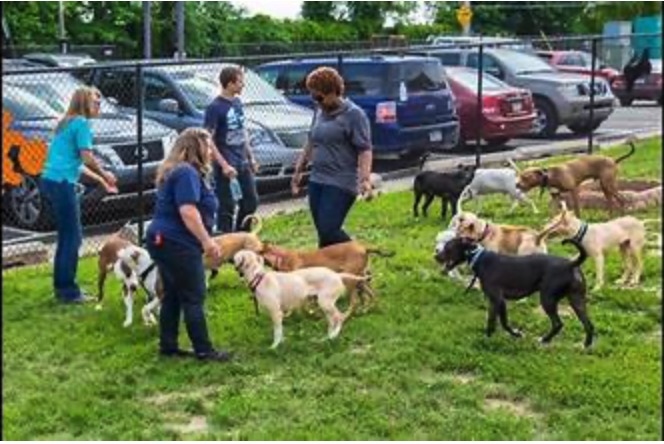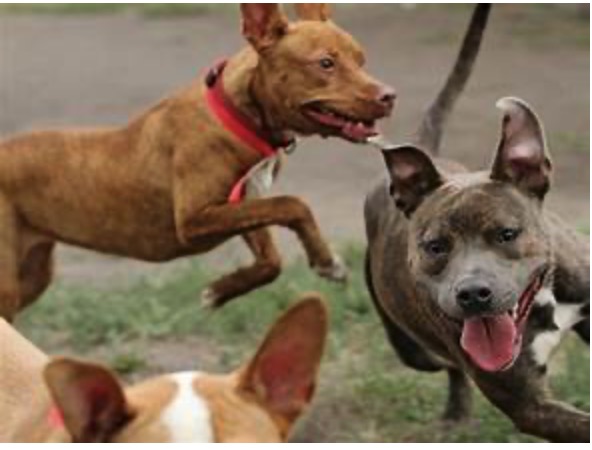Comments
ANIMAL WATCH –
GERMAN SHEPHERD, LOBO, ATTACKED BY PIT BULL AT LAAS SHELTER
(See picture above)
The strange and unnatural philosophy that all dogs of all breeds need to be socialized and play with each other led to a tragedy during a “play group” exercise on July 15, when a Pit Bull, named Thunder, attacked ” Lobo,” a German Shepherd, at the Los Angeles Animal Services East Valley shelter. This caused Lobo to “redirect” and bite a volunteer with the non-profit organization Dogs Playing for Life (DPFL).
A 07/10/2024 Instagram post by the good Samaritan who found Lobo (pictured above) and took him to the shelter states:
“Although I found & returned him to his owner on Sun, he escaped again. Now he’s in the East Valley Shelter & is up for adoption Friday. The current owners had just rescued Lobo from an abusive owner last week. He had been beaten. He’s so sweet & needs to find love. These current owners fear immigration so they’re not going to the shelter to release him. “ He added, “HE DESERVES A LOVING HOME. He’s listed as Luther #A2150528 at East Valley 14409 Vanowen St. Van Nuys, CA 91405 -(888) 452-7381.”
A few days later, on July 15, “Thunder,” attacked Lobo during a Dogs Playing for Life (DPFL} play group session, intended to demonstrate how nicely shelter dogs (including unneutered large-breed males) play together in a confined area and, therefore, can be safely adopted to homes and families with or without pets.
Thunder, the black-and-white Pit Bull (also pictured above) was estimated by the shelter to be close to ten years old and had come into the shelter on 6/04/24 as an “Over the Counter” stray. This often means the owner has not microchipped or licensed the dog and wants to dump it after a lack of care and/or for behavioral issues, without admitting responsibility.
Thunder was examined by the veterinary technicians and showed signs of neglect which were diagnosed as a “chronic skin condition, both ears having crusting and a yellowish wax condition,” and also a prurient nasal discharge, all conditions which “showed improvement after treatment,” was noted on 7/12.
Several volunteers who walked Thunder or spent time in his kennel and posted notes on the shelter’s record to try to help him get adopted, described him as “very easy-going, gentle and happy,” and at least two added, “no issues when walked in the parking lot.”
But that all changed when Thunder was taken to a “play group.”
CAN PLAY GROUPS SET SOME DOGS UP FOR FAILURE?

A Psychology Today article, “The Power and Importance of Social Play for Sheltered Dogs“ described, “Dogs Playing For Life" as a joy-filled enrichment program so dogs can be dogs. By creating a safe haven and allowing them to play to their heart's content it's a win-win for all,” it states.
But, at a play group on 7/15, the “easy going” Thunder, reportedly engaged Lobo in a fight. And, when the DPFL volunteer stepped between them to stop the vicious attack, Lobo “redirected to her.” The accident form showed the “Victim suffered multiple puncture wounds to both arms, and one puncture to her right calf. She was taken to the emergency room immediately.”
A volunteer who was walking Thunder, described the quick, but violent, incident, as follows:
“PLAYGROUP. [Thunder] mingled at first, went after Valkyrie – handler was able to break up with SC, but Thunder redirected onto Lobo who was nearby. This caused Lobo to redirect onto handler trying to break them up; unresponsive to SC (pet corrector not attempted), collar came off. [Thunder] continued to go after him, had to be scruffed by 2nd handler, while 1st handler used breakstick. (Lobo chose to disengage as soon as Thunder was off.) Thunder was removed from yard by scruff.”
Later that day a “medical follow up” was posted regarding Thunder, “Dog is now under Rabies Observation Quarantine Hold due to suspected bite during DPFL.”
AFTER ATTACK.
Thus, L.A. Animal Services promptly announced on July 16 that Thunder could be adopted only by a “rescue” during the ten-day quarantine period. This means the rescue would be responsible for finding him a new home and relieve the shelter of liability, but it does not mean Thunder is a “safe” animal.
ATTACKS AT LAAS SHELTERS ARE BECOMING A REGULAR EVENT

Just recently, on June 17, CityWatchLA reported the attack on Leslie Correa, a 25-year veteran Animal Care Technician and supervisor at the Harbor Shelter. And, just weeks later. an alleged “Rottweiler,” which uniquely resembled a Black-and White Pit Bull, attacked a mother at the South L.A. shelter while her husband and two children watched.
See: “No Kill” Policy is Blamed for the Brutal Dog Attack on LA Animal Services Supervisor Leslie Correa
Mother Attacked by Dog at LA Animal Services' Shelter as Family Watches
VOLUNTEER TAKEN TO HOSPITAL / PIT BULL OFFERED TO “RESCUERS”
The DPFL volunteer was transported to a hospital, with no further report in the file. Thunder was mercifully euthanized before he could harm anyone else, but not before he was offered to “rescue” groups. This means he could have been adopted to the public by a private group, with the City shelter escaping liability.
But, is this fair to the dog? And is it fair to potential adopters, who are entitled to full disclosure of the dog’s known behavior?
SETTING DOGS (AND ADOPTERS) UP FOR FAILURE
Both Thunder and Lobo were available for anyone to adopt from the shelter for a minimum investment and take to homes and neighborhoods where there could have been other innocent victims. This policy by Los Angeles Animal Services and all shelters must stop.
A “no harm” policy must apply to adopters and other humans, as well as to animals.
Whether adopting from a tax-funded facility or a private shelter, the public must be guaranteed that every effort has been made to assure the temperament of the dog is acceptable in homes and in the community, where other people and animals live in close proximity.
PLAYING “RUSSIAN ROULETTE” WITH PIT BULLS AND AGGRESSIVE DOGS
This incident proves that even the “experts” in non-profit experimental groups cannot predict behavior; however, it is also evident that volunteers are overlooking "signals” in the responses of many dogs, because body language in temperament testing provides clues that a dog may not like to be touched or may not be tolerant of other dogs.
These can be ignored when the animal is kept in a kennel, but it is what happens when it is in social situations that provides the unignorable truth.
Animal shelters and the large humane groups (Best Friends Animal Society (BFAS), Humane Society of the US (HSUS) and American Society for Prevention of Cruelty to Animals (ASPCA) must be held accountable for professing that all aggressive-breed dogs need is love to become gentle pets.
Just months ago, Dog-Bite Attorney Kenneth M. Phillips announced that a $6 milllion award was made for an attack which cost taxpayers (name) Meat Grinder. We have greater need for our tax dollars than to continue supporting BFAS, HSUS and ASPCA by increasing their donations by professing that “No Kill” is euphoria. Just like human criminals raised in wonderful families, each dog is “who it is,” and society has an obligation to assure that innocent victim and taxpayers do not have to support a myth that brings in billions of dollars to wealthy non-profit organizations.
Because no one wants to look at the reality of failure to curtail breeding is seeming more and more to be a tool to allow the very problems that donations are supposed to curtail.
Let’s hope that Lobo, a beautiful German Shepherd, who reportedly had not no interest in fighting and was merely protecting himself, finds a good home with someone with fencing that can contain him and that potential adopters at the shelter are notified he is a repeat “escape artist.”
EVEN PROFESSIONALS MAKE MISTAKES
It is alarming that an experienced DPFL volunteer would make the obvious mistake of stepping between two dogs already involved in a fight and be injured.
Animal Humane Society provides an effective response to how to handle this, “If a fight breaks out, go to the dogs (don't call from across the room), clap loudly or make a loud noise to startle them. When they release, grab the hips of the dog behaving inappropriately and pull the dog away. Don't grab collars or step between them. This can result in a redirected bite at you.”
Animal Humane Society provides some practical guidelines regarding play groups for dogs: However, perhaps we should lessen our concern over how shelter dogs interact with other dogs (unless there is specific evidence of aggression) and spend more time observing, evaluating and training how they interact with humans, before we place them in homes with strangers.
While play with other dogs may be an important activity for a few, shelter dogs are already under extreme stress, and the attack on Lobo by Thunder during the session, and Lobo’s reaction, caused him to do exactly what could cost his own life—he bit a human.
(Phyllis M. Daugherty is a former Los Angeles City employee, an animal activist and a contributor to CityWatch.)






